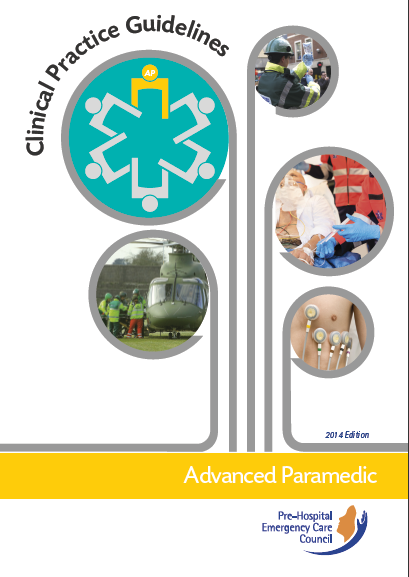2014 Edition CPGs
 The 2014 Edition CPGs have been released on 31st July 2014 following a long process. A decision of the Medical Advisory Committee to reduce ‘clutter’ on the CPGs has resulted in a leaner version of several CPGs. The information boxes removed from the CPGs have not been lost but are included in the field guide and field guide App. This will assist practitioners with decision making in the field.
The 2014 Edition CPGs have been released on 31st July 2014 following a long process. A decision of the Medical Advisory Committee to reduce ‘clutter’ on the CPGs has resulted in a leaner version of several CPGs. The information boxes removed from the CPGs have not been lost but are included in the field guide and field guide App. This will assist practitioners with decision making in the field.
The scope of practice for all practitioners has been enhanced, permitting improved patient care. The primary goal of significant trauma management remains scoop and run however during transport the introduction of Tranexamic acid and dressings impregnated with haemostatic agents will improve patient outcomes.
Practitioner safety has also been improved with the introduction of intranasal medications, particularly Naloxone for narcotic overdose.
Asthma management has been improved through the introduction of peak expiratory flow measurement and Ipratropium Bromide for paramedics and nebulised Salbutamol for EMTs.
Due to the introduction of direct access to primary PCI centres the need for pre-hospital thrombolysis has been significantly reduced and as a result this has been removed from the scope of practice of advanced paramedics.
New CPGs have been introduced for all practitioner levels, 15 for advanced paramedics, 16 for paramedics and 7 for EMTs. Four new CPGs have been introduced for responders. Appendix four outlines the details of all the changes.
First Aid Response (FAR) is a new clinical level for PHECC responders. It sits in parallel with OFA in terms of clinical content. This standard offers training and certification to individuals and groups who require a first aid skill set including cardiac first response. This standard is designed to meet basic first aid and basic life support (BLS) requirements that a certified person, known as a “First Aid Responder”, may encounter in their normal daily activities. The Health and Safety Authority has requested PHECC to continue publishing CPGs for OFA, however they are exactly the same as the FAR CPGs.
Another new concept introduced with the 2014 Edition CPGs is Basic Tactical Emergency Care (BTEC). BTEC enables an enhanced skill set for pre-hospital emergency care in hostile or austere environments for both EFRs and EMTs. BTEC is restricted to people who have the potential to provide emergency first response in hostile or austere environments and who are working or volunteering on behalf of a Licensed CPG Provider with specific approval for BTEC provision.
Brian Power,
Programme Development Officer.